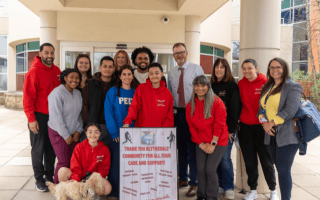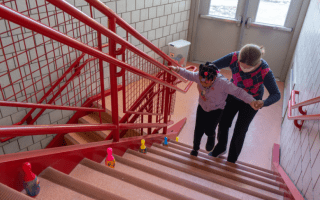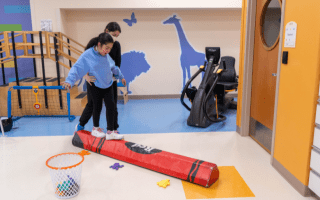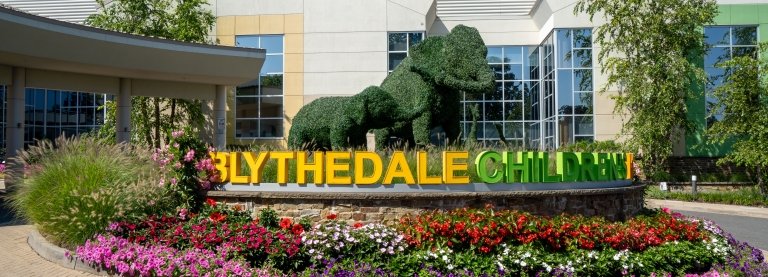Thriving Theo
Driven Teen Excels in Recovery from Stroke
For the first fourteen years of his life, Theo was healthy and active. He spent time with his family, hung out with friends, played sports at summer camp and excelled in school. But in November 2016, everything changed.
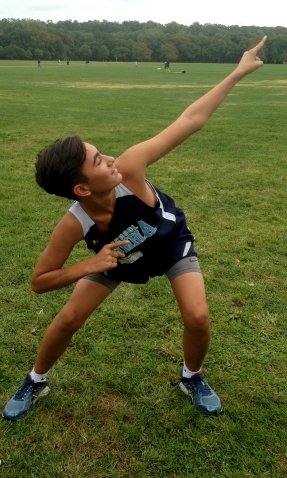
While at his home in Manhattan, the teen unexpectedly developed severe headaches. The following day, in gym class, he experienced sudden weakness to the right side of his body and was rushed to the hospital where doctors determined he had suffered a stroke.
“It was surreal because that usually happens in older people, not a healthy kid like me,” said Theo.
While hospitalized, his condition worsened due to side effects from the medication used to treat him and he suffered an intracranial hemorrhage to the left side of his brain. To relieve the pressure from the bleeding, Theo’s medical team performed a decompressive hemicraniectomy – surgery to remove part of his skull. This procedure saved his life but also resulted in paralysis to the right side of his body.
Once medically stable, Theo was transferred to Blythedale Children’s Hospital for intensive rehabilitation of the acquired brain injury he suffered secondary to an ischemic stroke.
“When he arrived he couldn’t verbally communicate, only gestures, and he couldn’t use his right arm and right leg because of the damage to the left side of the brain,” said Dr. Jay Selman, Chief of Pediatric Neurology at Blythedale. “Strokes do occur in children, but they’re much, much less common than in the adult population.”
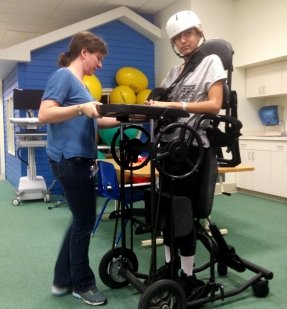
A new reality was setting in for Theo and his family, but a simple sentence on their first full day at Blythedale gave them renewed hope.
“Theo’s therapist walked into the room, gave their introduction and then said, ‘We’re going to start working’, and that was the big jolt of positive energy we needed,” recalled Lei, Theo’s mom.
While Theo was an inpatient, he made steady improvements with the assistance and guidance of his multidisciplinary team comprised of medical staff from Blythedale’s acclaimed Traumatic Brain Injury Unit, including his neurologist, neuropsychologist, physical, speech and occupational therapists, other physicians and his specially trained nursing staff.
His inner strength and family support were also important components of Theo’s road to recovery.
“He gradually got to the point where he could hold himself up while sitting, then was able to walk with a cane and now he doesn’t need an assistive device,” said Teresa Smith, Theo’s physical therapist at Blythedale. “It’s incredibly fulfilling to see a young man who struggled with such a scary diagnosis and disability, to come through and show his personality and intelligence, all while keeping his sense of humor.”
It was that laughter and drive that also helped Theo regain his voice after months of hard work.
“We’ve come leaps and bounds because he’s now speaking in complete sentences, reading at grade-level and writing with the aid of some technology, “ said Dayna Henn, Theo’s speech therapist. “He continues to fight and work really hard which I think is just a big testament to him.”
While regaining his ability to walk and communicate, his therapists also tapped into Blythedale’s expansive Assistive Technology (AT) Program to strengthen his extremities impacted by the stroke.
“His right arm was completely flaccid and we utilized various AT like electrical stimulation and Tyromotion for his rehabilitation treatments, and now, his arm is activated and he’s made incredible improvements,” said Kathryn Fegan, occupational therapist. “I think so many kids can benefit from assistive technology here and Blythedale is such a unique place that has all this tech, but also, all that heart and hope.”
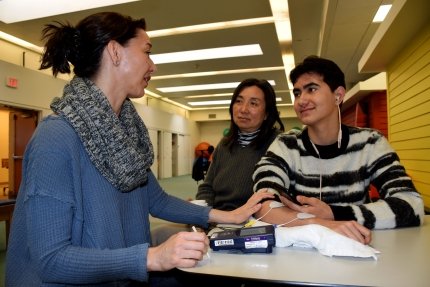
“The incredible staff of nurses, nursing assistants, therapists, school teachers, nurse practitioners and physicians is what differentiates us,” said Dr. Selman. “We have a lot of experience and all work closely together to help patients and families.”
Last spring, Theo was discharged from the inpatient unit to continue his therapies and treatments through Blythedale’s Day Hospital Program. While in this program, Theo attends the Hospital’s on-site school to keep up with his class work. At the Mt. Pleasant-Blythedale School, he can continue to earn credits toward his high school diploma while also participating in Regents level courses and exams.
“This opportunity has been offered to Theo with the help of our highly qualified teachers who help children continue their education, alongside their peers, while their bodies heal,” said Dr. Emily Hersh, Superintendent of Mt. Pleasant-Blythedale Union Free School District. “Our school program is a pivotal component of the rehabilitation process.”
Another important aspect of Theo’s recovery is his participation in ground-breaking research as part of the Burke-Blythedale Pediatric Neuroscience Research Collaboration, a partnership between Burke Neurological Institute and Blythedale Children’s Hospital.
Twice a week, Theo straps on robotic arms and plays a video game as part of the BAT (Bimanual Arm Trainer) system. His arms move together, with the stronger arm helping to train his impaired arm.
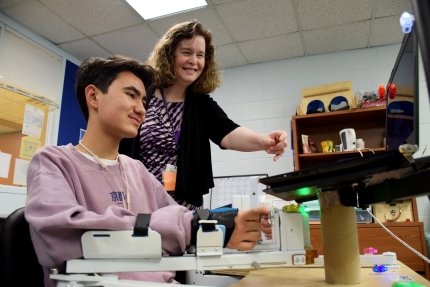
“The goal of this therapy is to improve range of motion while gaining movement accuracy and we’ve already seen improvements in Theo,” said Dr. Kathleen Friel, Director of Hemiplegia Research at Blythedale. “Here, the variety of therapies and research projects help bring the best out in the children.”
June 2018 can’t come fast enough for Theo. Not only does he turn 16, but he will also be discharged from the Day Hospital program in preparation to return to public school in the fall.
“I feel like a shark now. I just want to keep moving forward, keep recovering, keep getting better,” said Theo. “Blythedale has been amazing.”
Similar feelings expressed by his mom, Lei, who values the emotional, physical and medical supports the Hospital has provided to her and her son. “We live in New York City and there are top flight hospitals, research institutes and medical schools, but there is no place like Blythedale that specializes in children’s recovery,” she said. “It’s an oasis of wellbeing and a place that sick children can have an opportunity to have the best of everything in their recovery and return to a normal life.”
